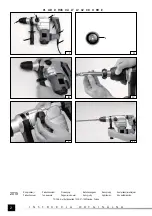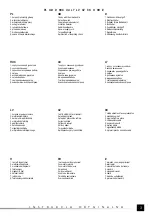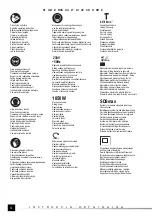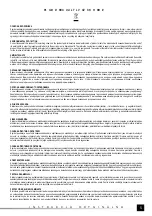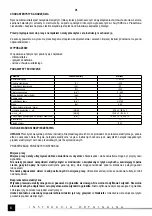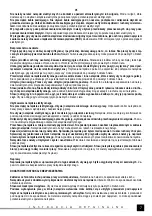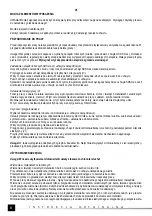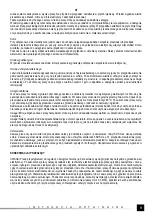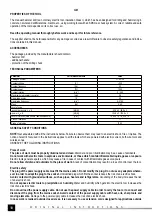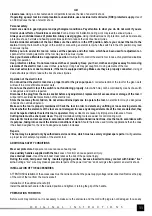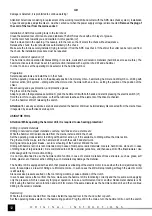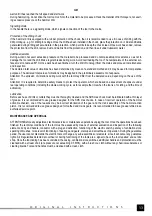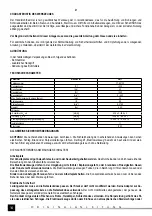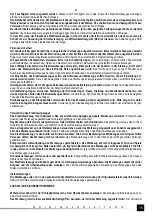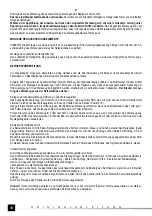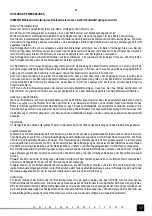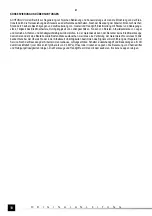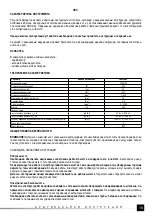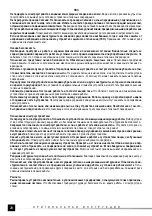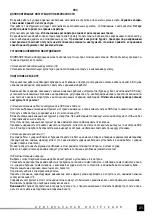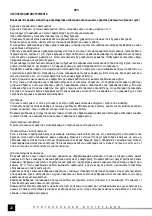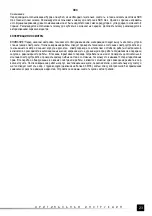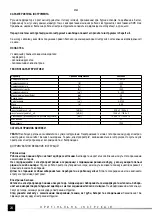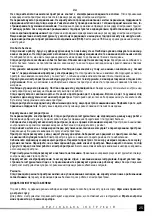
10
GB
O R I G I N A L I N S T R U C T I O N S
PROPERTIES OF THE TOOL
The manual hammer drill is an ordinary electric tool, insulation Class II, which has been designed for drilling and hammering in
concrete, natural and artificial stone, marble, etc., using working tools with an SDS max chuck system. A correct, reliable and safe
operation of the tool depends on its correct use, so:
Read the operating manual thoroughly before work and keep it for future reference.
The supplier shall not be held responsible for any damage occurred as a result of failure to observe safety regulations and indica-
tions contained in this manual.
ACCESSORIES
The package provided by the manufacturer should contain:
- hammer drill
- additional handle
- protection of the drilling chuck
TECHNICAL PARAMETERS
Parameter
Unit of measurements
Value
Catalogue number
YT-82130
Nominal voltage
[V]
~230
Nominal frequency
[Hz]
50
Nominal power
[W]
1050
Nominal rotation
[min
-1
]
0 - 480
Maximum hole diameter (concrete)
[mm]
38
Hammering energy
[J]
9,0
Hammering frequency
[min
-1
]
0 - 3780
Mass
[kg]
6,65
Level of noise
- acoustic pressure L
pA
± K
[dB(A)]
93,8 ± 3 / 95,8 ± 3
- power L
wA
± K
[dB(A)]
104,8 ± 3 / 106,8 ± 3
Level of vibration (main handle / additional handle)
[m/s
2
]
14,89 ± 1,5 / 13,02 ± 1,5
Class of insulation
II
Grade of protection
IP20
GENERAL SAFETY CONDITIONS
NOTE!
Get acquainted with all the instructions below. Failure to observe them may lead to an electric shock, fire or injuries. The
notion of electric tool used in the instructions applies to all the tools which are powered with electric current, both wire tools and
wireless ones.
OBSERVE THE FOLLOWING INSTRUCTIONS
Place of work
The place of work must be properly illuminated and clean.
Disorder and poor illumination may be a cause of accidents.
Do not work with electric tools in explosive environments, or those which contain inflammable liquids, gases or vapours.
Electric tools generate sparks, which may cause a fire in case of contact with inflammable gases or vapours.
Do not allow children and outsiders to the place of work.
A lack of concentration may result in a loss of control over the tool.
Electric safety
The plug of the power supply cable must fit the mains socket. Do not modify the plug. Do not use any adapters whatso-
ever in order to adapt the plug to the socket.
Unmodified plug which fits the socket reduces the risk of an electric shock.
Avoid contact with grounded surfaces, such as pipes, heaters and refrigerators.
Grounding of the body increases the risk
of an electric shock.
Do not expose electric tools to precipitation or humidity.
Water and humidity which gets into the electric tool increases the
risk of an electric shock.
Do not overload the power supply cable. Do not use the power supply cable in order to carry the tool or to connect and
disconnect the plug from the mains socket. Avoid contact of the power supply cable with heat, oils, sharp tools and
moving elements.
Damage to the power supply cable increases the risk of an electric shock.
In case work is realised outside closed areas, it is necessary to use extension cords designed for applications outside
Summary of Contents for YT-82130
Page 20: ...20 RUS...
Page 21: ...21 RUS III SDS max SDS max SDS max IV SDS max V VI...
Page 22: ...22 RUS 60 o C...
Page 23: ...23 RUS SDS max SDS max 0 3 MPa...
Page 25: ...25 UA...
Page 26: ...26 UA III SDS max SDS max SDS max IV SDS max V VI...
Page 27: ...27 UA 60o C SDS max SDS max...
Page 28: ...28 UA 0 3 MPa...


